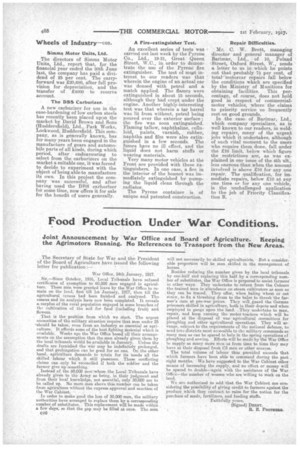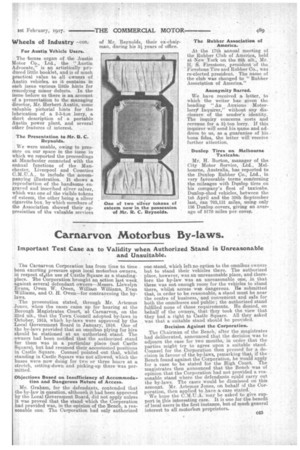Food Production Under War Conditions.
Page 12

Page 13

If you've noticed an error in this article please click here to report it so we can fix it.
Joint Announcement by War Office and Board of Agriculture. Keeping the Agrimotors Running. No References to Transport from the New Areas.
. The Secretary of State for War and the President of the Board of .Agriculture have issued the following letter for publication • War Office, 24th January, 1917. Sir,—Since October, 1916, Local Tribunals have refused certificates of exemption to 60,000 men engaged in agriculture. These men were granted leave by the War Office to remain on the land, first till 1st January, 1917, then till the agricultural census • had been finished and analyzed. The census and its analysis have now been completed. It reveals a surplus of the rural population engaged in some branches of tip cultivation of the sell for food (including fruit) and flowers.
That is the position from which we start. The urgent necessities of the military situation require that men under 25 -should be taken; even from an industry so essential as agriculture. It affords some of the best fighting material which is available. Weeks ago the War Office based all their arrangements on the assumption that the men already given them by the local tribunals would be available in January. Unless the drafts are furnished the war may be indefinitely prolonged, and that prolongation can be good for no one. On the other hand, agriculture demands to retain for its needs all the skilled labour which it still ii0.9SCSSeS. These conflicting claims can only be reconciled if both the soldier and the farmer give up something. •
Instead of. the 60,000 men whomthe Local Tribunals have already given 'to the Army as being, in their judgment and from their local knowledge, not essential, only 30,000 are to be called up. .. No more men above this number can be taken from agrjeulture without the express approval and sanction of the War .Cabinet. •
In order to make good the loss of 30,000 men, the military authorities have arranged to replace them by a corresponding number of substitutes. This replacement will be made within a few days, so that the gap may be filled at once. The men
c4.0 will not necessarily be skilled agriculturists. But a considerable proportion will be men skilled in the management of horses.
Besides reducing the number given by the local tribunals. by one-half and replacing this half by a corresponding nurnber of substitutes, the War Office is prepared to assist farmers in other ways. They undertake to return from the Colours the trained men in attendance on steam cultivators as soon as they can be traced. They offer, when baling wheat or oat straw, to fix a threshing drum to the baler to thresh the farmer's corn at pre-war prices. They will ,guard the German prisoners skilled in agriculture, both' in their depots and when employed in gangs upon the land. , They undertake to man, repair, and keep running the motor-tractors which will be placed at the disposal of war agricultural committees for ploughing and other agricultural operations. They will arrange, subject to the requirements of the national defence to send into districts most accessible to the military command:s. as many men as can be spared to help in the spring operations of ploughing and sowing. Efforts will be made by the War Office to supply as many more nien as from time to time they may have at their disposal froth C3 men or other sources.
The total volume of labour thus provided exceeds that which farmers have been able to command during the past eight months. We have suggested to the War Cabinet other means of increasing the supply, and no effort or money will be spared to double—again with the assistance of the War Office—the-number of women who are willing to work on the land.
We are authorized to add that the War Cabinet are considering the possibility of giving credit to farmers against the produce which they contract to raise for the nation for the purchase of seeds, fertilizers, and feeding stuffs.
Faithfully yours,
(Signed) DEP.ST. R. E. Pnoxszno.
For Austin Vehicle Users.
The -house organ of the Austin Motor Co., Ltd., the, " Austin Advocate," is an artistically produced little booklet, and is of much practical value to all owners of Austin vehicles, as it oontains in each issue various little hints for remedying minor defects. In the issue before us there is an account of a presentation to the managing director, Mr. Herbert Austin, some valuable pictorial hints for the lubrication of a 2-3-tan lorry, a short description of a portable Austin power plant, and several other features of interest.
The Presentation to Mr. R. C. Reynolds.
We were unable, owing to pressure on our space in the issue in which we reported the proceedings at Manchester connected with the annual functions of the Manchester, Liverpool and Counties C.M.U.A., to include the aecompanying illustration. It shows a reproduction of the handsome engraved and inscribed silver salver, which was one of the visible tokens of esteem, the other being a silver cigarette box, by which members of the Association showed their appreelation of thc valuable services
of Mr. Reynolds, their ex-chairman, during his 31 years of office. The Rubber Association of America.
At the 17th annual meeting of the Rubber Club of America, held at New York on the Sth ult., Mr. H. S. Firestone, president of the Firestone Tire and Rubber Co., was re-elected president. The name of the club was changed to "Rubber Association of America."
Anonymity Barred.
We have received a letter, to which the writer has given the heading "An Anxious Motorlorry Inquirer," without any disclosure of the sender's identity. The inquiry concerns costs and revenue for a 24-ton lorry. If this inquirer will send his name and address to us, as a. guarantee of his. bona fides, the letter will -receive further attention.
Dunlop Tires on Melbourne Taxicabs.
Mr. H. Burton, manager of the City Motor Service, Ltd., Melbourne, Australia, has reported to the Dunlop Rubber co., Ltd., in very favourable terms conderning the mileages with Dinalop tires on his company's fleet of taxicabs. Dunlop-shod vehicles, between the 1st April and the 30th September last, ran 703,131 miles, usingonly 136 Dunlop covers, giving an average of 5170 miles per cover.
























